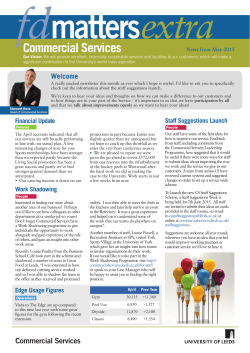
Oslo CF and MI [Kompatibilitetsmodus]
Leeds Institute of Health Sciences Cystic fibrosis: an example of research and practice Dr Gary Latchford 2015 Leeds Institute of Health Sciences Plan • Questions from earlier presentation • Cystic Fibrosis • Our work in CF: – Clinical practice, research, and a focus on adherence… Leeds Institute of Health Sciences Questions? Leeds Institute of Health Sciences Cystic Fibrosis (CF) • Inherited (Autosomal recessive) – Commonest inherited life limiting condition in Caucasians (1/2500 affected births) • Typically presents in childhood Leeds Institute of Health Sciences Mutation • Mutation in cystic fibrosis transmembrane regulator (CFTR) – Chloride blocked – mucus builds up (e.g. in lungs) – Multisystemic consequences Leeds Institute of Health Sciences Consequences • Lungs prone to infection & damage • Diabetes • Poor weight gain • Infertility • Nb segregation Leeds Institute of Health Sciences Consequences • Prognosis improving – Before 1939, 85% died by age 2 – Predicted survival 40 yrs for 1990 birth cohort • But heavy disease burden • And intrusive adherence regimen – – – – Physiotherapy to keep lungs clear Tablets with every meal Antibiotics to keep lungs sterile And more! Leeds Institute of Health Sciences One Day’s Treatment! Leeds Institute of Health Sciences Adherence • A study of nebuliser use (for anti-biotics) in CF: < 40% adherence. • No one taking all medications as prescribed. – Latchford, G., Duff, A., Quinn, J., Conway, S. & Conner, M. (2009). Adherence to nebulised antibiotics in cystic fibrosis. Patient Education and Counselling, 75: 141–144. Leeds Institute of Health Sciences CF in Norway • Approx. 280 patients with CF in Norway • About 60% over 18 Leeds Institute of Health Sciences What we do in Leeds • Clinical services • Research • Our work on adherence Leeds Institute of Health Sciences Clinical services Paediatric regional unit Adult regional unit Brownlee brothers in Triathlon! Leeds Institute of Health Sciences Clinical Services • • • • 2 psychologists in paediatric unit (1.5 wte) 2 psychologists in adult unit (1.2 wte) Reasons for referral? Paediatric: – adherence, procedural distress (e.g. needles), parental anx/dep, pre-school behaviour problems (esp. feeding), child/adolescent anx/dep • Adult: – Psychological support (& trauma), anx/dep, OCD, adherence Leeds Institute of Health Sciences Clinical Services • Recent survey on anxiety and depression (TIDES study) • Higher rates in parents • Rates for adults with CF? – No higher than general population in Leeds (Latchford & Duff, 2013) – Because already receiving psychological support? – Individuals do become distressed; related to decline in health & serious consequences.. Leeds Institute of Health Sciences Clinical Services • Currently screening patients and parents using depression and anxiety measures • Also using routine, sessional measurement of outcome and therapeutic alliance Leeds Institute of Health Sciences Research Clinical Psychology Training Programme Paediatric regional unit Adult regional unit Leeds Institute of Health Sciences Research • Recent Clinical Psychology Trainee doctoral research in CF – Adherence beliefs of children and their parents – Experience of education and employment – Experience of young mothers with CF – Beliefs about new drug treatments – Decision making about risk of infection Leeds Institute of Health Sciences Our work on adherence Leeds Institute of Health Sciences Tackling adherence • Individual referrals • But too many patients: team needs to change practice • How can we help the team change? • Duff AJA; Latchford G. Adherence in cystic fibrosis; care teams need to change first. The Lancet Respiratory Medicine. 2014; 2 (9):683-685. Leeds Institute of Health Sciences Training CF teams in Motivational Interviewing (MI) 1. Provide training in adherence: – Potential reasons for non-adherence (e.g. Rob Horne’s necessity/concerns framework) – Behaviour change techniques 2. Provide training in MI 3. Help team think about support and organisational change Leeds Institute of Health Sciences Society Social/ cultural Influence Beliefs about treatment Team Family & Friends Context & resources Knowledge Aspects of Health Patient Professional treatment The Treatment Values Emotion Self-belief/ confidence Organisation & Planning Leeds Institute of Health Sciences The Necessity-Concerns Framework (Horne, 1997, 2003, 2006) NECESSITY CONCERNS Do I need the medication? Will it work? Will I get any adverse effects? Leeds Institute of Health Sciences The change process Beliefs, behaviours, etc. The Team Support Change in clinics etc Motivational Interviewing The Decision Behaviour Change Techniques The context of the team Leeds Institute of Health Sciences What is MI? Leeds Institute of Health Sciences Motivational Interviewing: origins • It began with alcohol, where the traditional treatment was… • Confront the patient until they accept their illness – Assumption: unless the patient admitted they were an ‘alcoholic’, they would not get better • What happened? – Patients denied the problem • Conclusion? – Put down to “poor willpower” Leeds Institute of Health Sciences Motivational Interviewing: the idea • An alternative view from Bill Miller: – Motivation is not fixed – it goes up and down! – Motivation is a product of the situation – So confronting someone makes them more stubborn – Instead, motivational interviewing is designed to enhance motivation to change • Worked with Steve Rollnick: – MI applied to many behaviours, including physical health Leeds Institute of Health Sciences A definition of Motivational Interviewing • A directive, client-centered counseling style for eliciting behaviour change by helping clients explore and resolve ambivalence • Rollnick and Miller, 1995 Leeds Institute of Health Sciences Key ingredients • Avoid confrontation • Don’t impose change on patients • Instead, help them to talk about their ambivalence and resolve it by choosing to change • Readiness to change is not a trait, but a fluctuating product of interpersonal interaction • Aim for a partnership, not expert/recipient Leeds Institute of Health Sciences Key skills & principles • Expressing empathy • Reflective listening • Respect client autonomy Leeds Institute of Health Sciences The spirit of MI (Rollnick and Miller, 1995) • But also: • “Motivational Interviewing is not a series of techniques for doing therapy but instead is a way of being with patients” Bill Miller Leeds Institute of Health Sciences What’s it like? • Jones, Latchford & Tober: client experiences of MI, an Interpersonal Process Recall study Leeds Institute of Health Sciences What’s it like? • Jones, Latchford & Tober: client experiences of MI “She’s driving the conversation, very very subtly, that’s the trick… She’s allowing me to take the reigns of the conversation, but she’s steering it very gently, allowing me to get out what I need to.” Leeds Institute of Health Sciences “She’s made us think about stuff I didn’t even know I was thinking.” Leeds Institute of Health Sciences Does MI work? • Extensive research base (> 100 trials) – E.g. some of the largest psychotherapy RCTs (Project MATCH, UKATT ) • 6 Meta analyses, most recent: • Lundahl et al (2013) – 48 RCTs in health Leeds Institute of Health Sciences Does MI work? Group of comparison Bigger effect when compared with a non-psychological Effect size intervention CI p (1=standard deviation) Weak 0.28 0.22-0.34 <0.001 (Waiting list, treatment as usual, written materials ) Strong 0.09 -0.01-0.18 0.080 (12-step program or cognitive behavioral As effective, no better – as expected therapy) BUT quicker (3 or 4 sessions) Leeds Institute of Health Sciences Are teams using MI already? • No • Moran, Latchford and Bekker (2008): analysis of routine consultations in a diabetes clinic – Minimal to no use of MI style – Patient centred style: higher patient satisfaction & greater expression of views • So if MI is to be used by teams, they need to be trained Leeds Institute of Health Sciences Training health professionals in MI • Difficult! – “No time” – Professionals sometimes think they are doing MI but are not – Therapist drift after training (Miller & Mount, 2001) Leeds Institute of Health Sciences Training CF teams in MI 2011-12 • Established training package: – 2 sessions, three months apart • Trained CF teams together in UK & Ireland • Feedback from questionnaire & telephone interview Leeds Institute of Health Sciences Training CF teams in MI 2011-12 • Positive feedback: teams like MI; believe it improves practice • Barriers and facilitators: • Support after training • Changing team culture • Duff AJ; Latchford GJ. Motivational interviewing for adherence problems in cystic fibrosis; evaluation of training healthcare professionals. J Clin Med Res. 2013; 5 (6):475-480. Leeds Institute of Health Sciences Embedding MI in CF care • Teams are very important in CF • MI in context of support from team: – Training for staff – Supervision and peer support – Embed MI in clinic structure • Current work: training adherence advocates/champions as resources for the team Leeds Institute of Health Sciences Takk! Noen Spørsmål? g.latchford@leeds.ac.uk
© Copyright 2025









